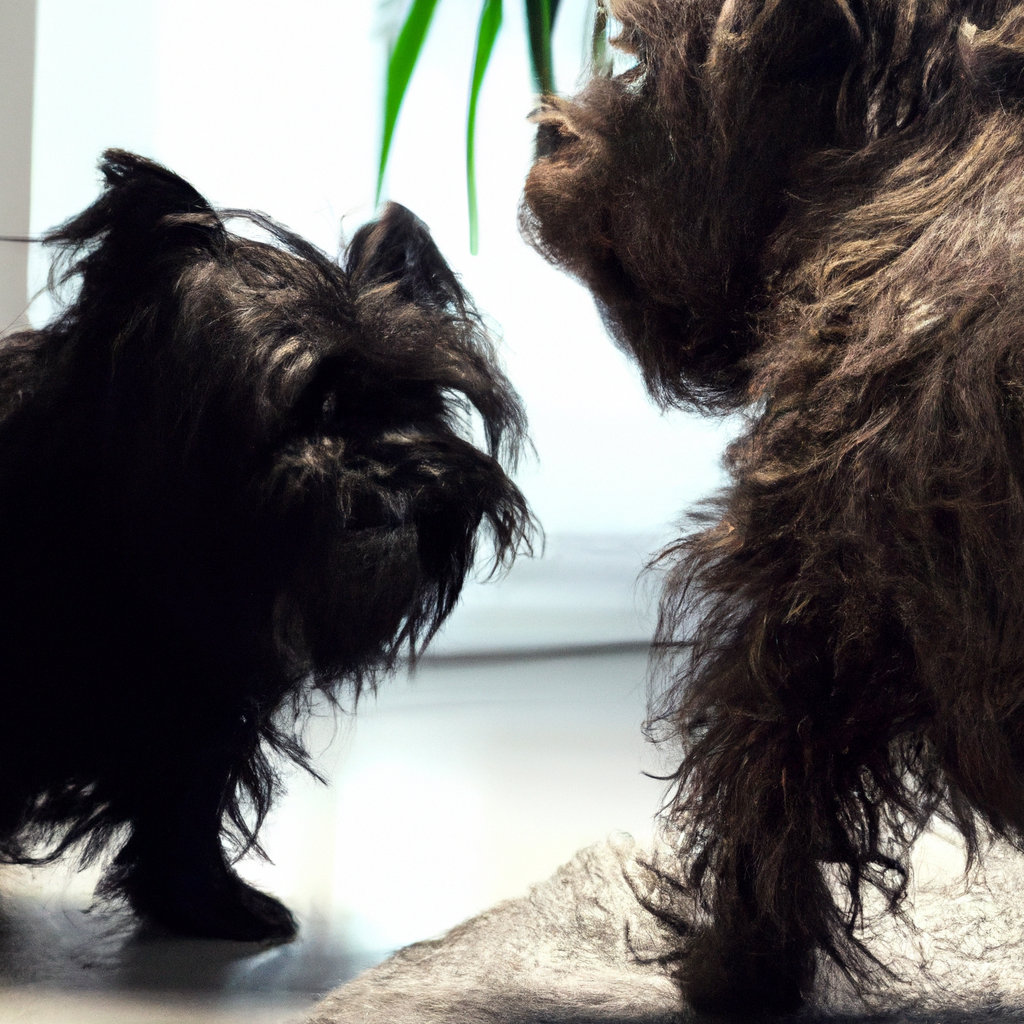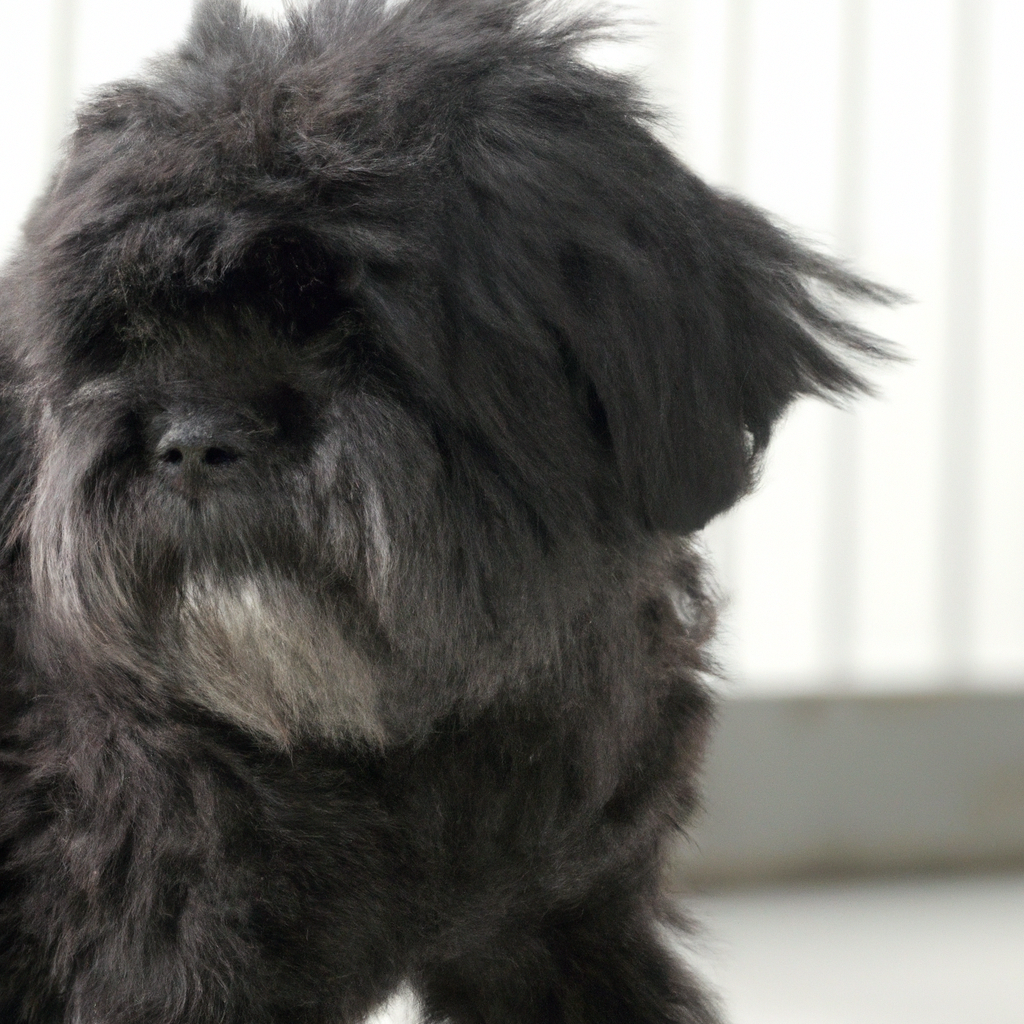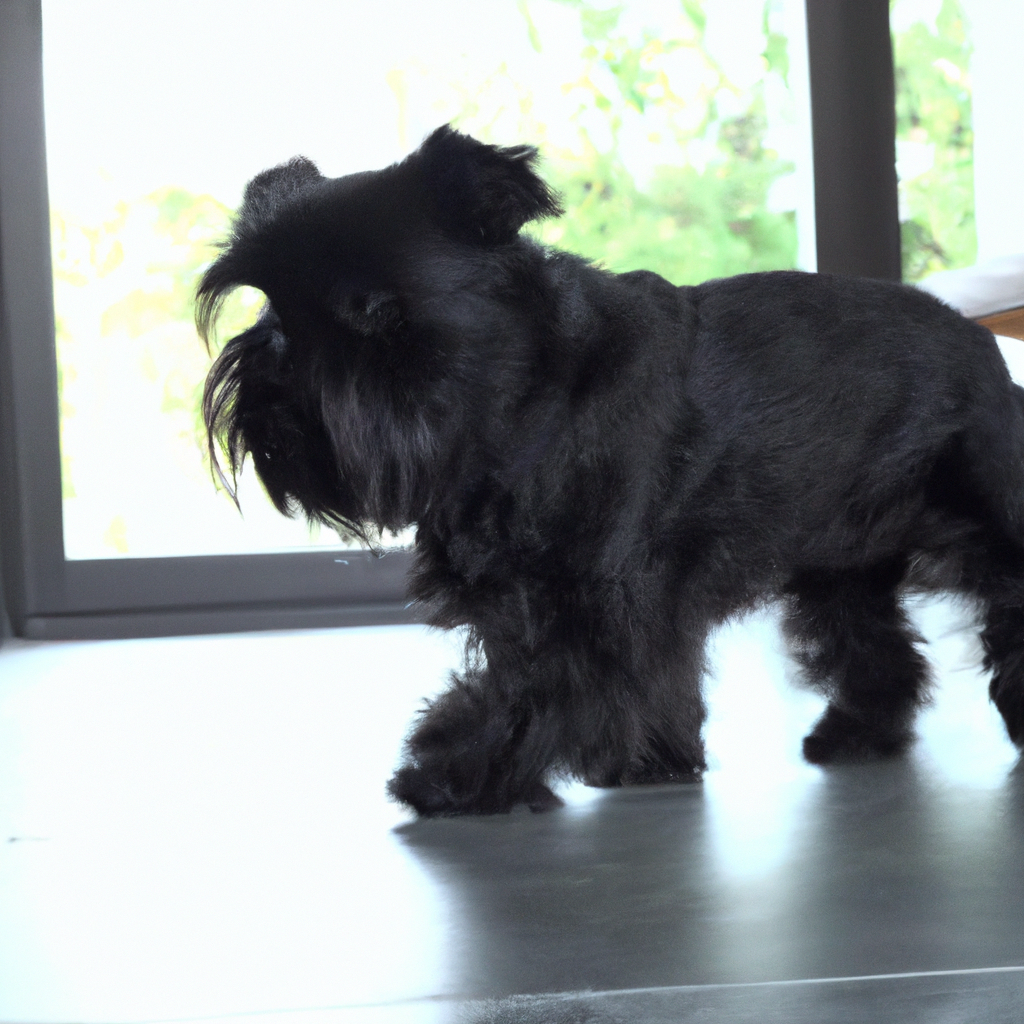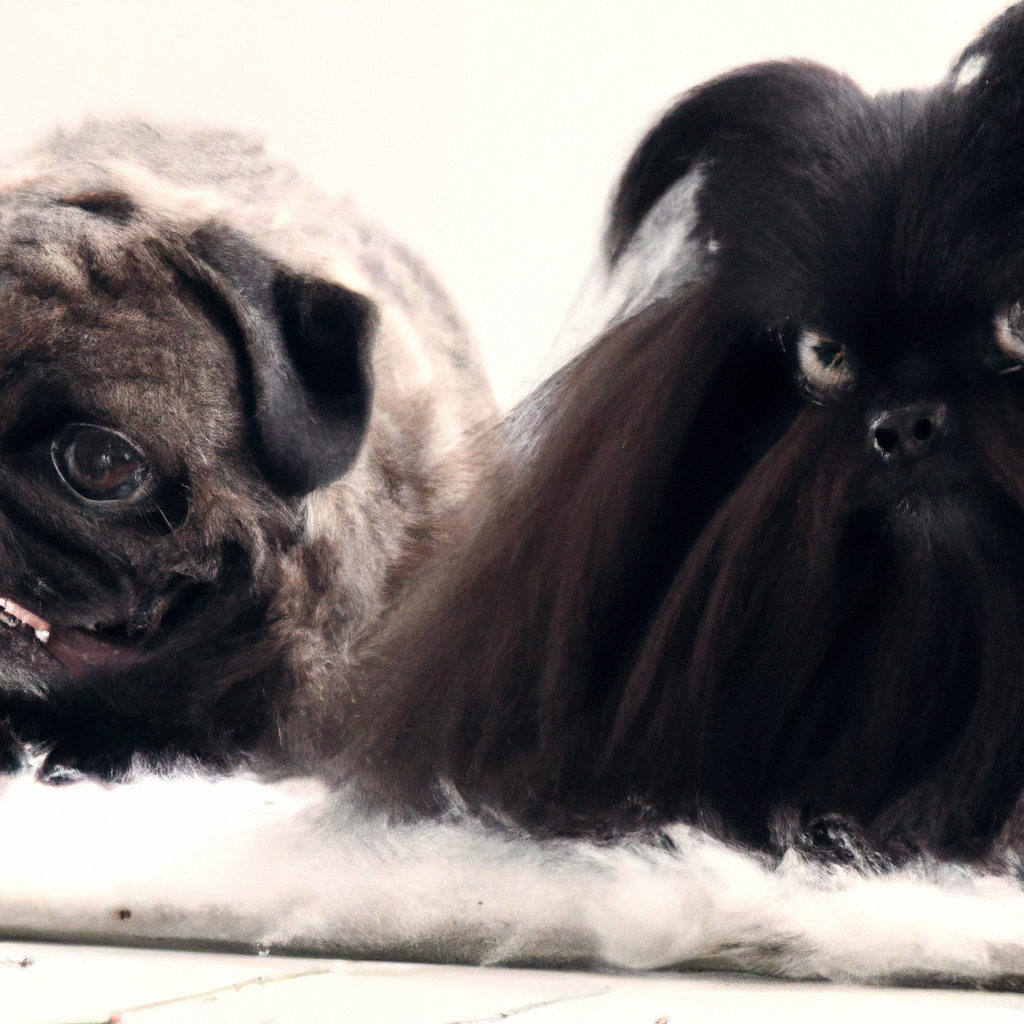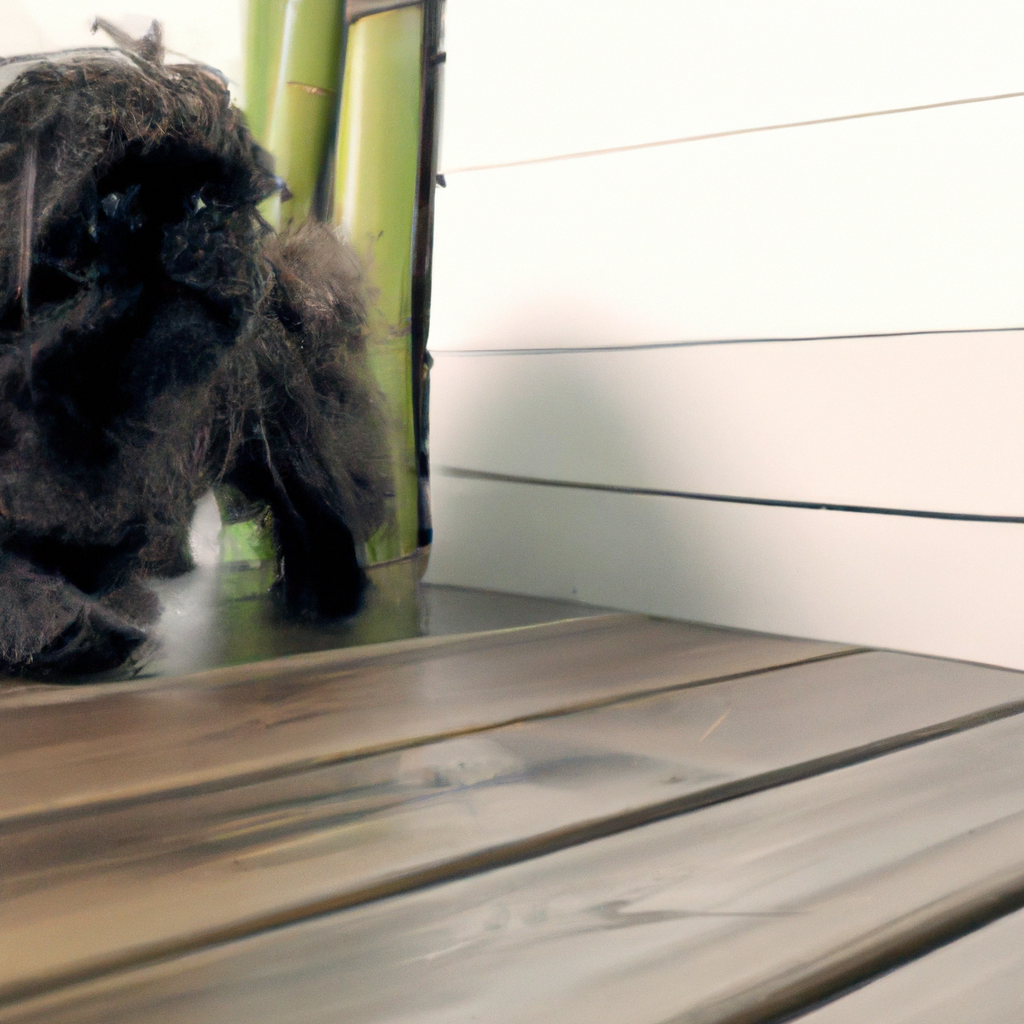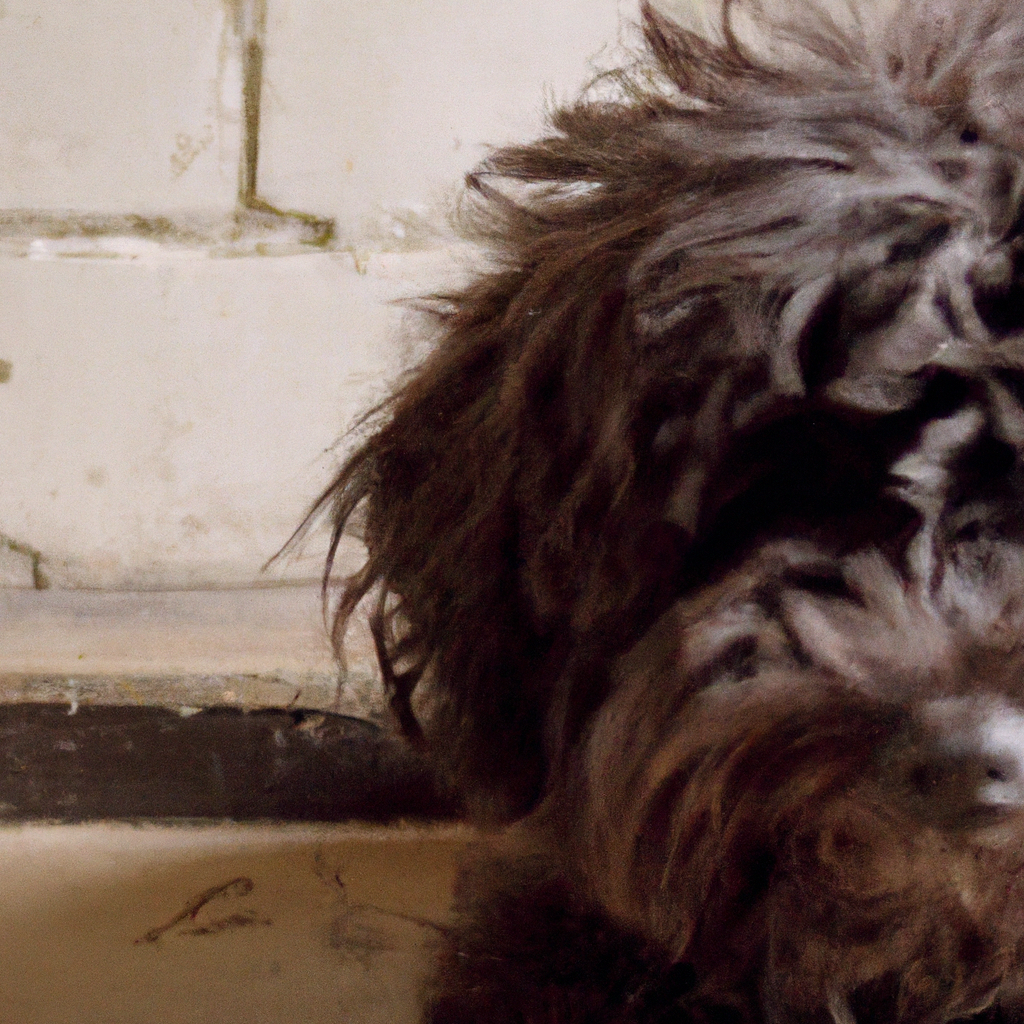The Affenpinscher, also known as the “Monkey Terrier”, is a small but feisty breed known for its distinctive appearance and lively personality. When it comes to behavior around other household pets, Affenpinschers can be quite territorial and assertive, often forgetting their small size when confronting larger animals. They are generally sociable and can coexist peacefully with other pets if properly socialized from a young age. However, due to their hunting origins, they may chase smaller animals and should be supervised. Their playful and energetic nature can make them great companions for other pets, but their stubbornness and independence might require patience and consistent training.
Understanding Affenpinscher Behavior Around Cats
Affenpinschers, often referred to as “Monkey Terriers” due to their distinct primate-like appearance, are a small breed of dog that originated in Germany. Known for their playful and adventurous nature, these dogs are a popular choice for pet owners worldwide. However, when it comes to understanding Affenpinscher behavior around other household pets, particularly cats, there are a few key points to consider.
Firstly, it’s important to remember that Affenpinschers were originally bred to hunt rats and other small vermin. This means that they have a natural instinct to chase smaller animals, which can sometimes include cats. However, this doesn’t necessarily mean that Affenpinschers and cats can’t live together harmoniously. In fact, many Affenpinscher owners report that their dogs get along quite well with their feline counterparts, provided they are introduced properly and given time to adjust to each other.
When introducing an Affenpinscher to a cat, it’s crucial to do so gradually and under controlled circumstances. Initially, keep them separated and allow them to get used to each other’s scent. Then, introduce them to each other in a neutral space, ensuring that both animals have an escape route if they feel threatened. It’s also a good idea to keep the Affenpinscher on a leash during these initial introductions, just in case its hunting instincts kick in.
Over time, the Affenpinscher and cat should start to feel more comfortable around each other. However, it’s important to monitor their interactions closely, especially in the beginning. Affenpinschers are known for their bold and fearless nature, which means they won’t hesitate to stand their ground if they feel threatened. This can sometimes lead to confrontations with cats, who are also known for their independent and territorial nature.
Despite these potential challenges, many Affenpinscher owners find that their dogs and cats eventually become the best of friends. This is particularly true if the Affenpinscher has been raised with cats from a young age, as this can help to curb its natural hunting instincts. Additionally, Affenpinschers are known for their sociable and affectionate nature, which means they often enjoy the company of other animals.
However, it’s worth noting that every Affenpinscher is unique, and their behavior around cats can vary greatly depending on their individual personality and experiences. Some Affenpinschers may be more tolerant of cats than others, while some may prefer to keep their distance. Therefore, it’s always a good idea to spend time observing your Affenpinscher’s behavior around cats before deciding to introduce them to your household.
In conclusion, while Affenpinschers have a natural instinct to chase smaller animals, this doesn’t necessarily mean they can’t get along with cats. With the right introduction and ongoing supervision, it’s entirely possible for these two species to live together in harmony. However, it’s important to remember that every Affenpinscher is unique, and their behavior around cats can vary greatly. Therefore, it’s always a good idea to monitor their interactions closely and be prepared to intervene if necessary.
How Affenpinschers Interact with Birds in the Home
Affenpinschers, often referred to as “Monkey Terriers” due to their distinct primate-like appearance, are small but mighty dogs known for their playful and adventurous spirit. These dogs are not just adorable, but they also have a unique personality that sets them apart from other breeds. One of the most intriguing aspects of Affenpinschers is their behavior around other household pets, particularly birds.
Affenpinschers are naturally curious and energetic, which can make their interactions with birds quite interesting. They are known for their bold and fearless nature, which can sometimes lead to them being a bit too enthusiastic when meeting new feathered friends. However, with proper socialization and training, Affenpinschers can learn to coexist peacefully with birds in the home.
When introducing an Affenpinscher to a bird, it’s important to do so gradually and under close supervision. Affenpinschers are small dogs, but they are also quite agile and quick, which can be intimidating to a bird. It’s crucial to ensure that the bird feels safe during these initial introductions. A slow and steady approach can help both pets get used to each other’s presence without causing undue stress.
Affenpinschers are known for their playful and sometimes mischievous behavior. They love to explore and can be quite inquisitive, which can lead to them wanting to play with the bird. However, it’s important to remember that birds are delicate creatures and rough play can potentially harm them. Therefore, it’s essential to teach your Affenpinscher to be gentle around the bird. This can be achieved through positive reinforcement training techniques, rewarding the dog for calm and gentle behavior.
Despite their energetic nature, Affenpinschers are also known for their loyalty and protective instincts. They are often very protective of their family members, including other pets in the household. This means that once an Affenpinscher has accepted a bird as part of the family, they will often go to great lengths to protect it. This can be a wonderful trait, but it’s also important to ensure that this protective behavior doesn’t become overbearing or cause stress for the bird.
One of the key factors in ensuring a harmonious relationship between an Affenpinscher and a bird is providing each pet with their own space. Birds need a safe and secure cage where they can retreat to when they need some quiet time. Similarly, Affenpinschers need their own space where they can relax and unwind. Ensuring that each pet has their own designated area can help prevent any territorial disputes and promote a peaceful coexistence.
In conclusion, while Affenpinschers are naturally energetic and curious, they can learn to live harmoniously with birds in the home with the right training and socialization. It’s important to introduce them gradually, teach them to be gentle, and provide each pet with their own space. With patience and understanding, an Affenpinscher and a bird can form a unique and special bond, adding an extra layer of joy and companionship to your household.
Affenpinscher and Rodents: A Guide to Coexistence
Affenpinschers, often referred to as “Monkey Terriers” due to their distinctive, primate-like faces, are a small breed of dog that originated in Germany. Known for their playful and adventurous nature, these dogs are a popular choice for pet owners worldwide. However, when it comes to their behavior around other household pets, particularly rodents, there are a few things to consider.
Affenpinschers are terriers by nature, and terriers are known for their high prey drive. This means that they have a natural instinct to chase and catch small, fast-moving creatures. This instinct was originally bred into them for hunting vermin, but it can sometimes cause issues in a modern household setting, especially if you have pet rodents like hamsters, guinea pigs, or rats.
However, this doesn’t mean that Affenpinschers and rodents can’t coexist peacefully. It simply means that you’ll need to take some precautions and put in a bit of extra effort to ensure everyone gets along.
Firstly, it’s important to remember that every dog is an individual, and not all Affenpinschers will react to rodents in the same way. Some may show little interest in them, while others may become fixated. It’s crucial to observe your Affenpinscher’s behavior around your rodent pets and take note of any signs of aggression or excessive interest.
One of the most effective ways to promote peaceful coexistence between your Affenpinscher and your rodent pets is through proper socialization. Introduce your Affenpinscher to your rodents slowly and under controlled conditions. Keep your Affenpinscher on a leash during these introductions so you can quickly intervene if necessary. Reward calm behavior with treats and praise to reinforce the idea that being calm and gentle around the rodents is good.
It’s also important to ensure that your rodents have a safe and secure living environment. Their cage should be sturdy and escape-proof, and it should be placed in a location that’s out of reach of your Affenpinscher. This will help to prevent any accidental injuries or escapes.
Despite these precautions, it’s essential to never leave your Affenpinscher unsupervised with your rodents. Even the most well-behaved and well-socialized dog can have a moment of instinctual behavior, and it’s better to be safe than sorry.
In addition to these measures, training your Affenpinscher can also be beneficial. Teaching commands like “leave it” or “stay” can be very useful in managing their behavior around your rodents. Remember, patience and consistency are key when it comes to training.
In conclusion, while Affenpinschers have a natural prey drive that can make them a bit tricky to manage around rodents, it’s certainly not impossible for them to coexist peacefully. With proper socialization, training, and precautions, you can create a safe and harmonious environment for all your pets. After all, Affenpinschers are known for their adaptability and their love of companionship, and with the right approach, they can form wonderful relationships with all members of your household, regardless of species.
The Dynamics Between Affenpinschers and Reptiles
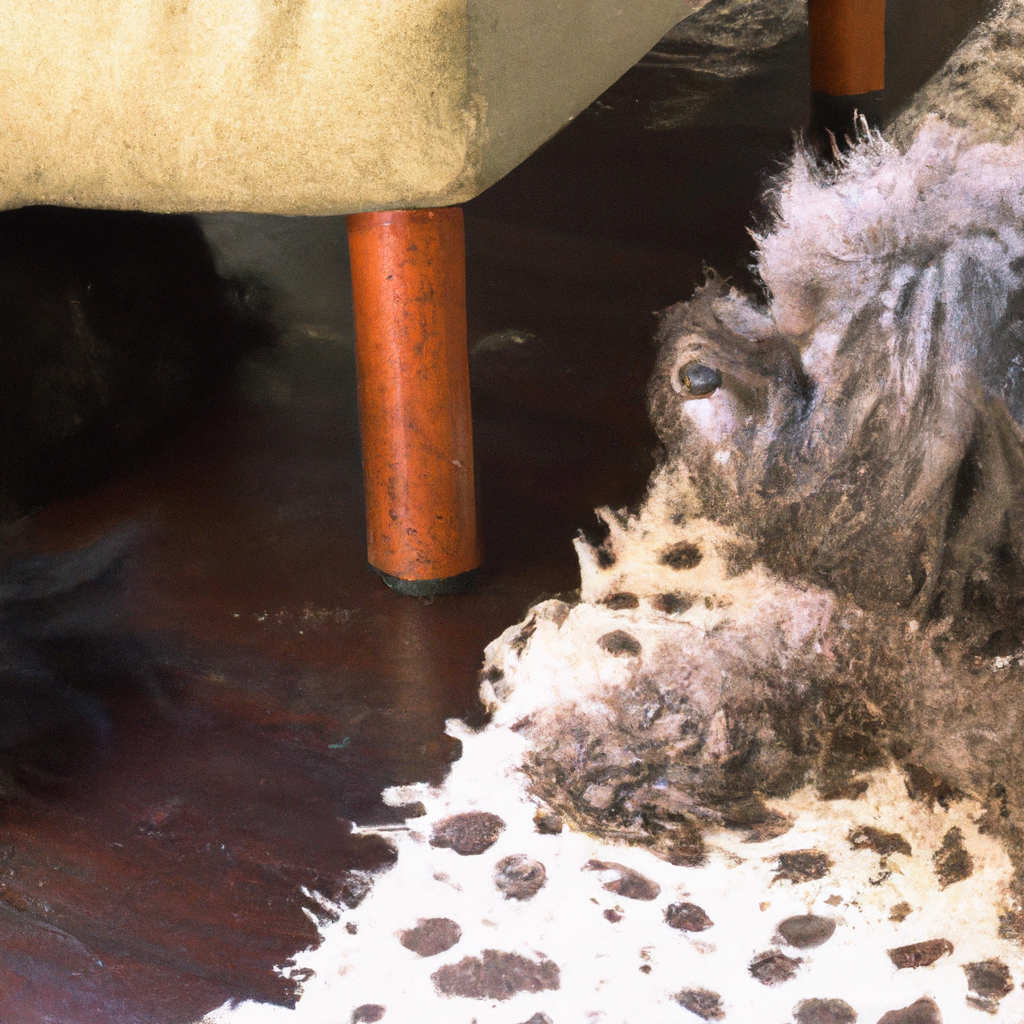
Affenpinschers, often referred to as “Monkey Terriers” due to their distinct primate-like appearance, are small but mighty dogs known for their playful and adventurous nature. These dogs are full of energy and have a strong protective instinct, which can sometimes lead to interesting dynamics when they interact with other household pets, particularly reptiles.
Reptiles, such as turtles, snakes, and lizards, are vastly different from dogs in terms of their behavior, needs, and communication styles. This difference can create a unique dynamic when an Affenpinscher shares a home with a reptile. It’s important to remember that Affenpinschers, like all dogs, are naturally curious and may be intrigued by the presence of a reptile in the house.
Affenpinschers are known for their bold and fearless nature. They are not easily intimidated, which can be both a positive and a negative trait when it comes to their interactions with reptiles. On the one hand, their bravery can prevent them from being overly scared or anxious around reptiles. On the other hand, their fearlessness can also lead them to be overly assertive or even aggressive, especially if they perceive the reptile as a threat.
One of the key factors that influence the dynamics between Affenpinschers and reptiles is the dog’s individual personality. Some Affenpinschers may be more laid-back and tolerant, while others may be more assertive and territorial. It’s also worth noting that Affenpinschers are known for their strong prey drive. This means that they have a natural instinct to chase and catch small animals, which could potentially include household reptiles.
However, this doesn’t necessarily mean that Affenpinschers and reptiles cannot coexist peacefully. With proper training and socialization, Affenpinschers can learn to respect the boundaries of their reptilian housemates. It’s crucial to supervise their interactions, especially in the beginning, to ensure that the dog doesn’t harm the reptile out of curiosity or playfulness.
When introducing an Affenpinscher to a reptile, it’s best to do so gradually and in a controlled environment. The dog should be kept on a leash at first, and the reptile should be in its enclosure. This allows the Affenpinscher to observe the reptile from a safe distance and get used to its presence. Over time, the dog can be allowed to get closer to the reptile, but always under close supervision.
It’s also important to teach the Affenpinscher to respect the reptile’s space. This can be done by setting clear boundaries and rewarding the dog for calm and respectful behavior. For instance, if the dog stays calm and doesn’t try to chase or pester the reptile, it should be praised and rewarded with a treat.
In conclusion, while the dynamics between Affenpinschers and reptiles can be complex due to their differing natures, it’s certainly possible for them to coexist peacefully with the right approach. It requires patience, understanding, and consistent training, but the result can be a harmonious household where all pets, regardless of their species, can live together in mutual respect.
Affenpinscher Behavior Around Other Dogs: What to Expect
Affenpinschers, often referred to as “Monkey Terriers” due to their distinctive, primate-like faces, are a small breed of dog that originated in Germany. Known for their playful and adventurous nature, these dogs are a popular choice for many pet owners. However, if you’re considering adding an Affenpinscher to a household with other pets, you might be wondering how they’ll get along. Specifically, how do Affenpinschers behave around other dogs? Let’s delve into what you can expect.
Affenpinschers are known for their bold and confident demeanor. Despite their small size, they are not afraid to stand their ground. This can sometimes lead to them being a bit territorial, especially around other dogs. They may see other dogs, particularly those of the same sex, as competition. This is a trait that is common in many terrier breeds, and the Affenpinscher is no exception. However, this doesn’t mean that they can’t get along with other dogs. With proper socialization and training, Affenpinschers can learn to coexist peacefully with their canine counterparts.
Socialization is key when it comes to integrating an Affenpinscher with other dogs. The earlier you can introduce your Affenpinscher to other dogs, the better. Puppies are much more adaptable and open to new experiences, so this is the ideal time to start socializing them. Regular playdates with other dogs, trips to the dog park, and even enrolling them in puppy classes can all help to expose your Affenpinscher to other dogs in a controlled and safe environment.
Training is also crucial. Affenpinschers are intelligent and eager to please, which makes them relatively easy to train. However, they can also be a bit stubborn at times, so patience and consistency are key. Positive reinforcement methods, such as treats and praise, work best with this breed. Teaching your Affenpinscher basic commands like “sit”, “stay”, and “leave it” can help to manage their behavior around other dogs.
It’s also important to remember that every dog is an individual, and not all Affenpinschers will react the same way to other dogs. Some may be more sociable and outgoing, while others may be more reserved or even aggressive. It’s crucial to pay attention to your dog’s body language and behavior when they’re around other dogs. If they seem uncomfortable or stressed, it’s best to remove them from the situation and try again another time.
In addition to other dogs, you might also be wondering how Affenpinschers behave around other types of pets. Generally speaking, Affenpinschers can get along well with other animals, provided they are properly introduced and socialized. However, due to their terrier instincts, they may have a high prey drive and could potentially see smaller pets, like rodents or birds, as prey. Therefore, it’s always important to supervise interactions between your Affenpinscher and other small pets.
In conclusion, while Affenpinschers can sometimes be territorial around other dogs, with proper socialization and training, they can learn to get along well with their canine counterparts. They are a bold, confident, and intelligent breed that can make a wonderful addition to any household. Just remember to be patient, consistent, and attentive to your dog’s needs and behavior, and you’ll be well on your way to creating a harmonious multi-pet household.
Managing Affenpinscher Interactions with Small Mammals
Affenpinschers, often referred to as “Monkey Terriers” due to their distinctive, primate-like faces, are a small breed of dog known for their playful and adventurous spirit. Despite their small size, they are fearless and often unaware of their diminutive stature, which can sometimes lead to interesting interactions with other household pets. This is particularly true when it comes to managing Affenpinscher interactions with small mammals.
Affenpinschers are naturally curious and energetic, which can sometimes be mistaken for aggression. However, it’s important to remember that these little dogs are more interested in play than in conflict. They are known for their playful antics and love of games, which can make them a great companion for other playful pets. However, their high energy levels and natural curiosity can sometimes lead to them being a bit too enthusiastic when interacting with smaller, more delicate pets.
When introducing an Affenpinscher to a household with small mammals, such as hamsters, guinea pigs, or rabbits, it’s important to do so gradually and under close supervision. Affenpinschers, like many terrier breeds, have a strong prey drive. This means that they may see small, fast-moving animals as something to chase or play with, rather than as fellow pets. This can lead to stressful situations for both the Affenpinscher and the smaller pet if not managed correctly.
One effective way to manage these interactions is through controlled introductions. Start by allowing the Affenpinscher to observe the small mammal from a distance, while the smaller pet is safely in its cage or enclosure. This allows the Affenpinscher to satisfy its curiosity without the risk of a high-energy chase. Over time, the Affenpinscher will become accustomed to the presence of the small mammal and will be less likely to see it as a plaything.
Another important aspect of managing Affenpinscher interactions with small mammals is training. Affenpinschers are intelligent dogs that respond well to positive reinforcement training. Teaching your Affenpinscher basic commands such as “leave it” or “stay” can be incredibly helpful in managing their interactions with other pets. This allows you to intervene if the Affenpinscher becomes too excited or playful, ensuring the safety and comfort of all your pets.
It’s also worth noting that every Affenpinscher is an individual, and their behavior can vary widely. Some Affenpinschers may be perfectly content to coexist peacefully with small mammals, while others may struggle to curb their playful instincts. It’s important to monitor your Affenpinscher’s behavior closely and adjust your approach as needed.
In conclusion, while Affenpinschers can sometimes be a handful when it comes to interacting with small mammals, with careful management and training, they can learn to coexist peacefully with other pets. Remember to introduce new pets gradually, use positive reinforcement training, and monitor your Affenpinscher’s behavior closely. With patience and understanding, your Affenpinscher can learn to see small mammals not as playthings, but as fellow members of the family.
Affenpinschers and Fish: A Study of Interactions
Affenpinschers, often referred to as “Monkey Terriers” due to their distinct primate-like appearance, are a breed of dog that is known for their lively and adventurous spirit. These small, yet energetic dogs are known for their playful and sometimes mischievous behavior. But how do they behave around other household pets, particularly fish? Let’s delve into the fascinating world of Affenpinschers and their interactions with their aquatic counterparts.
Affenpinschers are naturally curious creatures. Their inquisitive nature often leads them to explore their surroundings, including the other animals in the household. This curiosity, however, does not necessarily translate into aggression. In fact, Affenpinschers are generally known to be quite sociable and friendly, even with other species. This is particularly true when it comes to fish.
Fish, with their quiet, serene nature and captivating movements, can be a source of fascination for many Affenpinschers. The sight of fish swimming gracefully in their tank can be quite mesmerizing for these little dogs. They may spend hours watching the fish, their noses pressed against the glass of the aquarium, their eyes following every movement. This can be a peaceful and calming activity for both the dog and the fish, as long as the dog’s curiosity does not get the better of them.
However, it’s important to remember that Affenpinschers, like all dogs, have a natural instinct to chase and catch. This instinct can be triggered by the movement of the fish. Therefore, it’s crucial to ensure that the aquarium is secure and out of reach to prevent any potential mishaps. A sturdy stand and a well-fitted lid can go a long way in ensuring the safety of your fish.
While Affenpinschers are generally good-natured and friendly, they can sometimes be a bit territorial. This is especially true if they feel that their space is being invaded. Therefore, it’s important to introduce the fish gradually and in a controlled manner. This can be done by allowing the Affenpinscher to observe the fish from a distance initially, gradually decreasing the distance over time. This slow introduction can help the dog get used to the presence of the fish and reduce any potential territorial behavior.
It’s also worth noting that Affenpinschers are intelligent and quick learners. They can be trained to behave appropriately around other pets, including fish. Positive reinforcement techniques, such as treats and praises, can be used to encourage good behavior. It’s also important to supervise their interactions until you are confident that the dog understands and respects the boundaries.
In conclusion, Affenpinschers can coexist peacefully with fish, provided that certain precautions are taken. Their curious and friendly nature can lead to fascinating interactions, making them a great addition to a household with a variety of pets. However, their natural instincts and territorial behavior need to be managed appropriately to ensure the safety and well-being of all pets involved. With patience, understanding, and proper training, Affenpinschers and fish can live together in harmony, providing endless entertainment and companionship for their human companions.
The Impact of Affenpinscher Behavior on Household Pet Harmony
The Affenpinscher, often referred to as the “Monkey Dog” due to its primate-like appearance and playful nature, is a small breed that packs a big personality. Known for their bold and sometimes stubborn demeanor, these dogs can be a delightful addition to any household. However, when it comes to introducing an Affenpinscher to other household pets, their behavior can significantly impact the harmony within the home.
Affenpinschers are naturally curious and energetic, which can be both a blessing and a challenge when they are around other pets. On one hand, their playful nature can lead to fun and engaging interactions with other animals. They are often eager to play and can provide endless entertainment for both their human companions and their fellow pets. On the other hand, their high energy levels and strong-willed nature can sometimes lead to conflicts, especially with other pets that are not as active or assertive.
One of the key factors that can influence an Affenpinscher’s behavior around other pets is their socialization. Like any breed, Affenpinschers need to be properly socialized from a young age to ensure they can interact positively with other animals. This involves exposing them to a variety of different pets, people, and environments in a controlled and positive manner. If an Affenpinscher is not properly socialized, they may become fearful or aggressive towards other pets, which can disrupt the peace within the household.
Another important factor to consider is the Affenpinscher’s natural prey drive. These dogs were originally bred to hunt rats and other small vermin, which means they have a strong instinct to chase and catch small, fast-moving objects. This can be problematic if you have small pets like hamsters, guinea pigs, or birds in your home. An Affenpinscher may see these animals as prey rather than companions, which can lead to stress and potential harm for your smaller pets.
Despite these potential challenges, many Affenpinschers can live happily alongside other pets with the right training and management. It’s important to supervise interactions between your Affenpinscher and other pets, especially in the beginning. Reward positive interactions and intervene if you see any signs of aggression or fear. It can also be helpful to provide separate spaces for your pets where they can retreat and relax if they need some alone time.
In conclusion, the impact of Affenpinscher behavior on household pet harmony can vary greatly depending on the individual dog and the other pets in the home. With proper socialization, training, and management, an Affenpinscher can be a fun and loving companion for both humans and other pets. However, it’s important to be aware of their natural instincts and potential challenges to ensure a peaceful coexistence. Remember, every Affenpinscher is unique, and what works for one may not work for another. It’s all about understanding your pets’ individual needs and working towards creating a harmonious household for all.Affenpinscher, with its bold and protective nature, can sometimes be territorial, which may lead to confrontations with other household pets. However, with proper socialization and training from a young age, they can coexist peacefully with other pets. They are known to get along better with pets of similar size, while their interactions with larger pets might require supervision.
